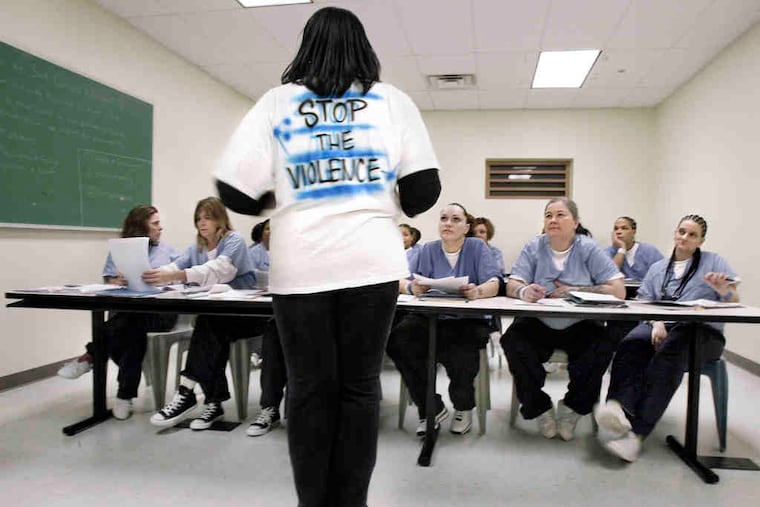Federal commission highlights harms and civil rights violations for women in prison
“Incarcerated women continue to experience physical and psychological safety harms while incarcerated and insufficient satisfaction of their constitutional rights,” the commission noted.

When Naomi Blount was sentenced to the State Correctional Institution Muncy in 1982, there were maybe 300 or 400 women there, and she had a cell to herself.
“Then as the years passed by and the population stated growing, that’s when they started doubling us up — and then quadrupling us up," said Blount, a former lifer who received commutation after 37 years and now works for the Pennsylvania Board of Pardons.
What she witnessed firsthand was a 600% increase in the female prison population in Pennsylvania — a trend mirrored in many other parts of the country.
A report from the U.S. Commission on Civil Rights released Wednesday found that prisons around the country have failed to manage that growth in a way that protects female prisoners and serves their needs.
Despite federal reforms, including the Prison Rape Elimination Act (PREA), “incarcerated women continue to experience physical and psychological safety harms while incarcerated and insufficient satisfaction of their constitutional rights,” the commission noted.
It found that women are subjected to disproportionately harsh punishments in prison, frequently lack access to the same programs and services available to men, and risk alienation from their families or even losing parental rights.
And, the commission concluded, “sexual abuse and rape remain prevalent against women in prison.” It noted that PREA required the establishment of a prison-rape review panel that would hold annual public hearings; the panel has not met since 2014.
The commission made 34 recommendations, from trauma-informed disciplinary policies, to stronger PREA enforcement, to providing free feminine-hygiene products.
However, many of the problems facing women in prison require cultural as well as policy change, said Claire Shubik-Richards, executive director of the Pennsylvania Prison Society.
In a review of three months of complaints by female prisoners to the Prison Society, she found nearly half were related to harassment by staff. The rest were connected to lack of access to health care or to conditions of confinement.
“Complaints about harassment from correctional staff are pretty rare from incarcerated men, but it’s the number-one reason why incarcerated women and their families are contacting us,” she said. “Particularly at Riverside” — Philadelphia’s county jail for women — “that is a frequent concern.”
The commission’s findings, that prison systems designed for men are fundamentally ill-equipped to house and rehabilitate women, are underscored by a series of lawsuits that have been filed around Pennsylvania in recent years.
Su Ming Yeh of the Pennsylvania Institutional Law Project, which has litigated many of those cases, said those shortcomings often arise around access to health care.
“For instance, county prisons often don’t have the staffing to have a full-time OB-GYN on staff, and that affects women’s health,” she said. “Along those lines, because there are fewer women incarcerated, they often suffer from the lack of equal treatment, equal conditions, and equal access to programs.”
One lawsuit, in Allegheny County, successfully stopped the jail from housing pregnant women in solitary confinement. Another, in Berks County, fought to give women on work release access to the same low-security housing men enjoyed. (A federal judge found the prisoners were facing illegal gender discrimination; the county responded to the lawsuit by shutting down the reentry housing for all prisoners, male and female.) In Lebanon County, a woman recently sued the jail for shackling her during childbirth, in violation of state law.
Many of the issues the commission cited pertain to childbirth, and what follows.
“Reports from incarcerated women include prison officials ignoring early symptoms of potential miscarriage until too late to intervene, failing to transport laboring women to the hospital, and forcing them to give birth in their cells alone,” the commission noted.
And for mothers in prison, maintaining a relationship with kids can be fraught. About 15% of mothers in state prison have no contact with their children, according to the report; 58% never receive visits from their kids.
Women in Pennsylvania state prisons are either at Muncy, about three hours’ drive from Philadelphia, or Cambridge Springs, close to seven hours away. The Prison Society runs buses — but, Shubik-Richards said, “one of the things that we find concerning is that our buses to Cambridge Springs and Muncy are some of our least popular.”
County jails are closer to home, but the visiting-room policies can be discouraging, either through limited hours, noncontact visits, or lengthy wait times.
A survey of 50 Pennsylvania county jails recently conducted by an advocacy group, the Dads’ Resource Center, found that 28 of the jails did not permit contact visits for parents, and 22 more allowed them only under certain conditions.
In Philadelphia, at a City Council hearing last year, Commissioner Blanche Carney detailed numerous reforms including a lactation program for new mothers, a Girl Scout troop for those with older children, and expanded visiting hours for mothers who give birth while in prison.
Instead of the standard one hour per week of visits, the new mothers are permitted two hours per week with their children, she said.